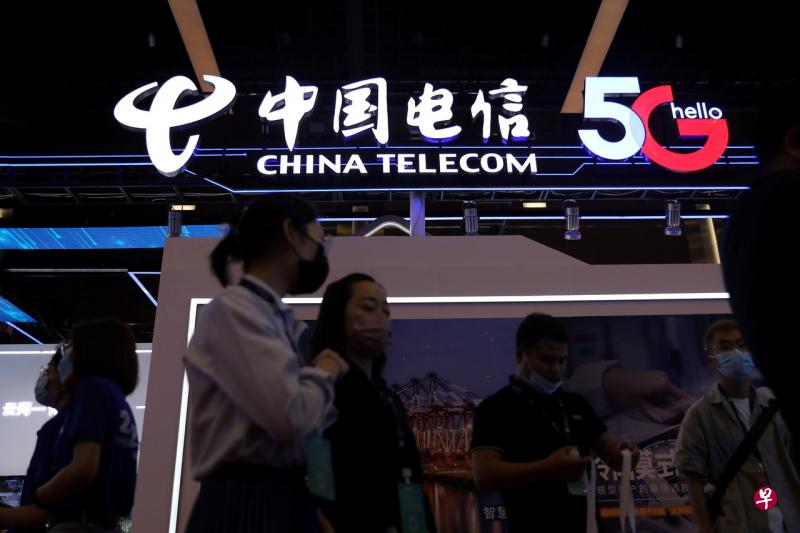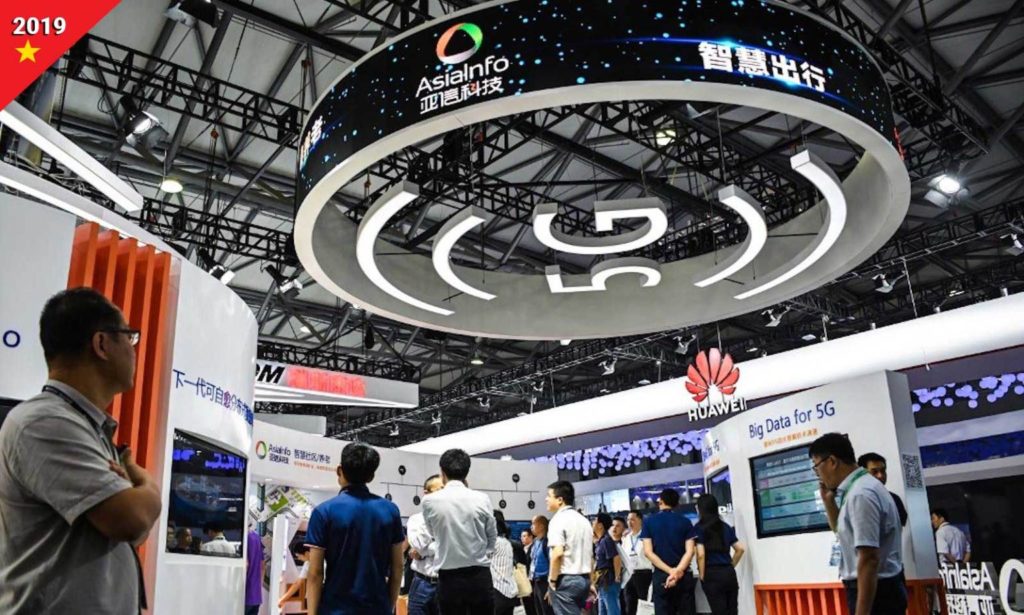中国就美撤销中国电信美洲公司牌照提出交涉
10/28/2021
针对美国撤销中国电信美洲公司在美运营牌照,中国商务部新闻发言人今天(28日)说,中国经贸团队已向美国提出严正交涉,中国将继续采取必要措施,维护中国企业正当权益。
据中新网报道,商务部新闻发言人束珏婷在例行新闻发布会上回应相关提问时说,美国此举在缺乏事实依据的情况下恶意打压中国企业,违背市场原则,破坏双方合作氛围,中国就此表示严重关切。
束珏婷敦促美国立即纠正错误做法,为在美投资经营的企业提供公平开放公正非歧视的营商环境。
美国联邦通信委员会(FCC)26日投票决定,撤销中国电信美洲公司(China Telecom Americas)的在美业务的授权,理由是出于国家安全考虑。
委员会指出,中国电信美洲公司是中国国营企业的美国分公司,是中国政府影响和控制的对象,非常可能被迫执行中国政府提出的要求。
美国吊销中国电信在美经营授权 限六天内停业
文 / 陈慧璋
10/26/2021

(早报讯)美国政府吊销中国电信国营公司在美的经营授权,并要求其在六天内停止业务。
美国之音报道,美国联邦通信委员会(FCC)周二(10月26日)宣布吊销和终止命令,吊销中国电信美洲公司(China Telecom Americas)在美国提供国内州际和国际通信服务的授权,要求中国电信美洲公司在命令公布的六天内停止任何国内和国际通信服务。
联邦通信委员会说:“促进国家安全是委员会促进公共利益责任的一部分,今天的行动落实了保卫国家通信基础设施免受潜在安全威胁的使命。”
委员会指出,中国电信美洲公司是中国国营企业的美国分公司,是中国政府利用、影响和控制的对象,非常可能被迫执行中国政府提出的要求。
委员会说,委员会将近20年前授权中国电信美洲公司在美国提供通信服务以来,与中国有关的国家安全环境已经发生了变化,中国电信美洲公司及其母公司和中国政府有机会接触美国通信,可以让他们对美国从事间谍和其他有害活动,对美国构成了巨大的国家安全和执法危险。
委员会并指出,中国电信美洲公司的行为以及向委员会和美国政府其他机构所做的陈述缺乏坦率、可信度和可靠性,削弱了委员会和美国政府其他机构要求通信公司所具备的基本信任水平,而且中国电信美洲公司故意违背了2007年与行政部份签署保证书(Letter of Assurances)的五项条款中的两项。委员会因此决定吊销中国电信美洲公司在美国经营电信业务的授权。

Tel: 551-580-4856 | Email: F.WINNIE.S@GMAIL.COM
诚招美国和加拿大法律服务代理
因公司发展需要,诚招美国和加拿大法律服务代理。
要求:
懂英语、或西班牙语、或法语。
能合法工作有社安号或工号。
无需改行, 可以兼职。
大学生和有销售经验优先考虑。
自雇生意公司发美国报税1099,加拿大T4A
有意了解详情, 请扫码加微信, 非诚勿扰!

China beating US by being more like America
Cultivating human capital will be essential if the US rather than China is to be the base of the next industrial revolution
By BRANDON J WEICHERT
4/25/2021

The United States transitioned from an agrarian backwater into an industrialized superstate in a rapid timeframe. One of the most decisive men in America’s industrialization was Samuel Slater.
As a young man, Slater worked in Britain’s advanced textile mills. He chafed under Britain’s rigid class system, believing he was being held back. So he moved to Rhode Island.
Once in America, Slater built the country’s first factory based entirely on that which he had learned from working in England’s textile mills – violating a British law that forbade its citizens from proliferating advanced British textile production to other countries.
Samuel Slater is still revered in the United States as the “Father of the American Factory System.” In Britain, if he is remembered at all, he is known by the epithet of “Slater the Traitor.”
After all, Samuel Slater engaged in what might today be referred to as “industrial espionage.” Without Slater, the United States would likely not have risen to become the industrial challenger to British imperial might that it did in the 19th century. Even if America had evolved to challenge British power without Slater’s help, it is likely the process would have taken longer than it actually did.
Many British leaders at the time likely dismissed Slater’s actions as little more than a nuisance. The Americans had not achieved anything unique. They were merely imitating their far more innovative cousins in Britain.
As the works of Oded Shenkar have proved, however, if given enough time, annoying imitators can become dynamic innovators. The British learned this lesson the hard way. America today appears intent on learning a similar hard truth … this time from China.
By the mid-20th century, the latent industrial power of the United States had been unleashed as the European empires, and eventually the British-led world order, collapsed under their own weight. America had built out its own industrial base and was waiting in the geopolitical wings to replace British power – which, of course, it did.
Few today think of Britain as anything more than a middle power in the US-dominated world order. This came about only because of the careful industrial and manipulative trade practices of American statesmen throughout the 19th and first half of the 20th century employed against British power.
The People’s Republic of China, like the United States of yesteryear with the British Empire, enjoys a strong trading relationship with the dominant power of the day. China has also free-ridden on the security guarantees of the dominant power, the United States.
The Americans are exhausting themselves while China grows stronger. Like the US in the previous century, inevitably, China will displace the dominant power through simple attrition in the non-military realm.
Many Americans reading this might be shocked to learn that China is not just the land of sweatshops and cheap knockoffs – any more than the United States of previous centuries was only the home of chattel slavery and King Cotton. China, like America, is a dynamic nation of economic activity and technological progress.
While the Chinese do imitate their innovative American competitors, China does this not because the country is incapable of innovating on its own. It’s just easier to imitate effective ideas produced by America, lowering China’s research and development costs. Plus, China’s industrial capacity allows the country to produce more goods than America – just as America had done to Britain
Once China quickly acquires advanced technology, capabilities, and capital from the West, Chinese firms then spin off those imitations and begin innovating. This is why China is challenging the West in quantum computing technology, biotech, space technologies, nanotechnology, 5G, artificial intelligence, and an assortment of other advanced technologies that constitute the Fourth Industrial Revolution.
Why reinvent the wheel when you can focus on making cheaper cars and better roads?
Since China opened itself up to the United States in the 1970s, American versions of Samuel Slater have flocked to China, taking with them the innovations, industries, and job offerings that would have gone to Americans had Washington never embraced Beijing.
America must simply make itself more attractive than China is to talent and capital. It must create a regulatory and tax system that is more competitive than China’s. Then Washington must seriously invest in federal R&D programs as well as dynamic infrastructure to support those programs.
As one chief executive of a Fortune 500 company told me in 2018, “If we don’t do business in China, our competitors will.”
Meanwhile, Americans must look at effective education as a national-security imperative. If we are living in a global, knowledge-based economy, then it stands to reason Americans will need greater knowledge to thrive. Therefore, cultivating human capital will be essential if America rather than China is to be the base of the next industrial revolution.
Besides, smart bombs are useless without smart people.
These are all things that the United States understood in centuries past. America bested the British Empire and replaced it as the world hegemon using these strategies. When the Soviet Union challenged America’s dominance, the US replicated the successful strategies it had used against Britain’s empire.
Self-reliance and individual innovativeness coupled with public- and private-sector cooperation catapulted the Americans ahead of their rivals. It’s why Samuel Slater fled to the nascent United States rather than staying in England.
America is losing the great competition for the 21st century because it has suffered historical amnesia. Its leaders, Democrats and Republicans alike, as well as its corporate tycoons and its people must recover the lost memory – before China cements its position as the world’s hegemon.
The greatest tragedy of all is that America has all of the tools it needs to succeed. All it needs to do is be more like it used to be in the past. To do that, competent and inspiring leadership is required. And that may prove to be the most destructive thing for America in the competition to win the 21st century.
Source: https://asiatimes.com/2021/04/china-beating-us-by-being-more-like-america/
Feb 18, 2021
Aug 4, 2020




